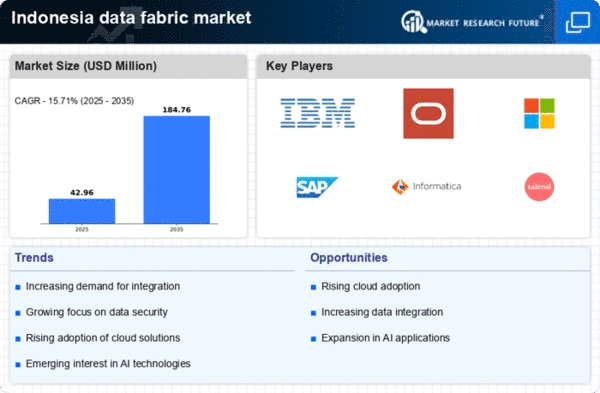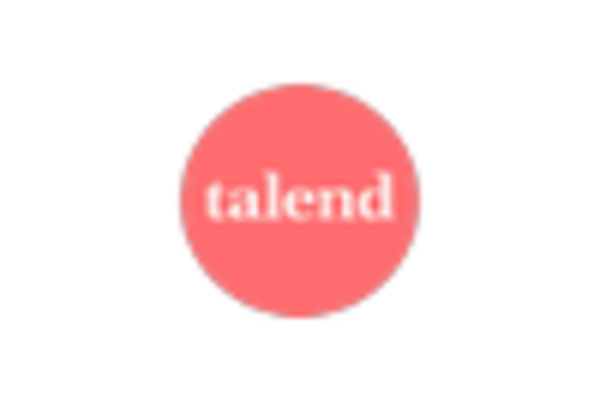Increased Investment in IT Infrastructure
In Indonesia, the data fabric market is poised for growth due to increased investment in IT infrastructure. Organizations are recognizing the need for modernized systems that can support the complexities of data management in a digital age. This investment encompasses cloud computing, data storage solutions, and network enhancements, all of which are critical for effective data integration. As companies allocate more resources towards upgrading their IT infrastructure, the demand for data fabric solutions is likely to rise. Projections suggest that the market could expand by approximately 18% in the coming years, driven by the necessity for scalable and efficient data management systems that align with evolving business needs.
Rising Demand for Real-Time Data Processing
The data fabric market in Indonesia experiences a notable surge in demand for real-time data processing capabilities. As businesses increasingly rely on timely insights to drive decision-making, the need for efficient data integration and management solutions becomes paramount. This trend is particularly evident in sectors such as finance and retail, where the ability to analyze data in real-time can lead to competitive advantages. According to recent estimates, the market for real-time data processing solutions is projected to grow at a CAGR of approximately 25% over the next five years. This growth is likely to propel the data fabric market, as organizations seek to implement architectures that support seamless data flow and accessibility.
Expansion of Digital Transformation Initiatives
In Indonesia, the ongoing digital transformation initiatives across various industries significantly influence the data fabric market. Organizations are increasingly adopting digital technologies to enhance operational efficiency and customer engagement. This shift necessitates robust data management frameworks that can integrate disparate data sources and provide a unified view of information. The Indonesian government has also been promoting digitalization efforts, which further stimulates the demand for data fabric solutions. As a result, the data fabric market is expected to witness substantial growth, with projections indicating an increase in market size by over 30% in the next few years, driven by the need for agile and scalable data architectures.
Growing Importance of Data Security and Privacy
The data fabric market in Indonesia is significantly impacted by the growing emphasis on data security and privacy. With increasing regulatory scrutiny and consumer awareness regarding data protection, organizations are compelled to adopt comprehensive data governance frameworks. This trend is particularly relevant in sectors such as healthcare and finance, where sensitive information is handled. The implementation of data fabric solutions can facilitate enhanced security measures, ensuring compliance with local regulations. As businesses prioritize data security, the market for data fabric solutions is likely to expand, with estimates suggesting a growth rate of around 20% over the next few years, as organizations seek to mitigate risks associated with data breaches.
Emergence of Advanced Analytics and Business Intelligence
The rise of advanced analytics and business intelligence tools in Indonesia is driving the evolution of the data fabric market. Organizations are increasingly leveraging data analytics to derive actionable insights and improve strategic decision-making. This trend necessitates the integration of various data sources into a cohesive framework, which data fabric solutions can provide. As businesses recognize the value of data-driven strategies, the demand for sophisticated analytics capabilities is expected to grow. Market forecasts indicate that the adoption of advanced analytics tools could lead to a 15% increase in the data fabric market over the next few years, as companies strive to harness the full potential of their data assets.
















